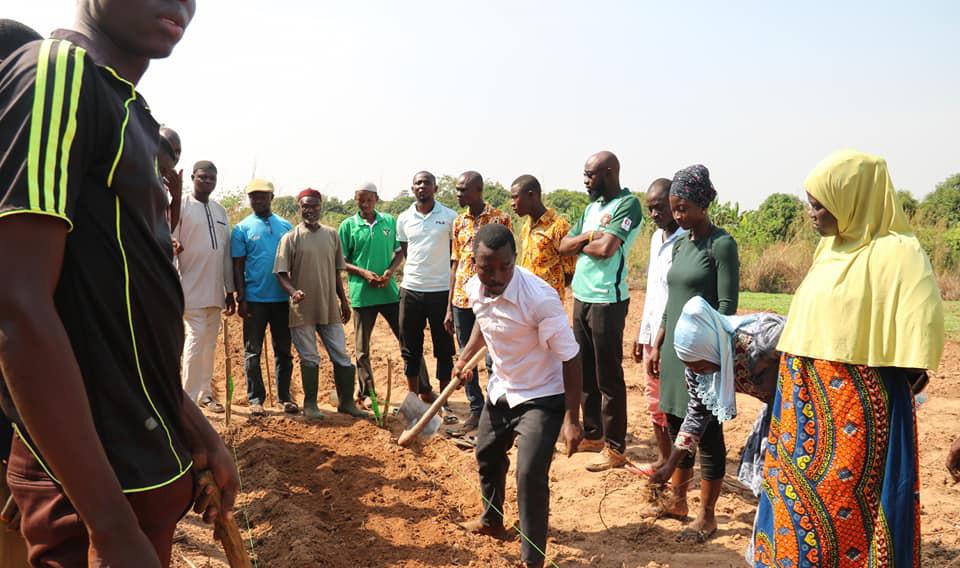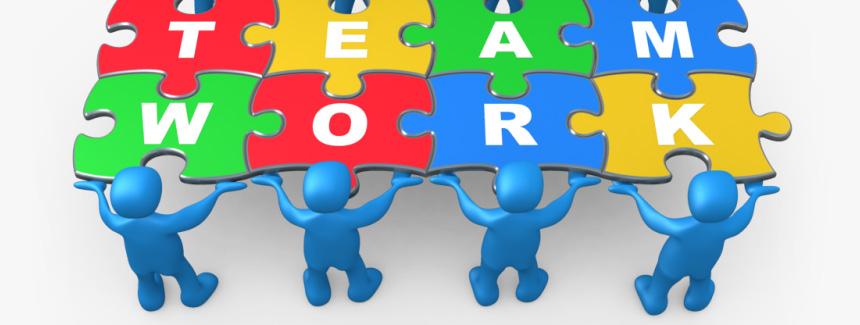
23 minute read
PARTNERS ORGANISATIONAL DEVELOPMENT, COLLABORATIONS AND CONNECTEDNESS
PARTNERS ORGANISATIONAL DEVELOPMENT, COLLABORATIONS AND CONNECTEDNESS
Advertisement
This section of the annual report presents outcomes recorded in 2020 relating to the partners organizational capacity building and development. It presents changes observed in YEFL-Ghana, GDCA, SfL and CLIP.
YEFL-Ghana
A new Youth Strategy development process was supported and finalized by the E4L Program. This new strategy is giving a much clearer focus and direction to YEFL-Ghana’s ways of working and in engaging donors. It is also helping in reshaping YEFL-Ghana’s ways of targeting and working with the young people and others in various ways.
The capacities of the Board in cooperate governance was strengthened during the period. This intervention has facilitated the board to transition a less stable organization to a more stable one and expanded its membership base as a membership organization. The board has also revised its constitution and have put in place functional sub – committees fulfilling their oversight, policy and decision – making functions.
Further, the knowledge management systems training has equipped us with the right tools to manage knowledge and reinforced what we are already doing to manage knowledge. An example is the use of Office 365. The establishment of a communication team internally is significantly projecting and marketing the organizational products, activities and engagements. This is keeping YEFL-Ghana in touch with their constituents for feedback on activities and engagements.
Ghana Developing Communities Association (GDCA)
The GDCA strategic plan expired in 2020. A framework for a new plan was developed. A brainstorming session was organized comprising members of the GDCA Steering Committee, Management, beneficiary CBOs, representatives of Metropolitan, Municipal and District Assemblies. The session reviewed the Vision and Mission statements and proposed strategies for the strategic plan. A session was also held to identify key performance indicators for the strategies. The rest of the strategic planning process will be completed in 2021.
The HR system is being re-organized with the acquisition of a software that is used to build a database for staff, board members and volunteers. The introduction of the system has enhanced recruitment procedures, making it easier to receive applications online, compile and shortlist quickly. This has brought great
improvement in the recruitment process. The system has been used to recruit two key staff during the year.
For the first time the annual evaluation of the Executive Director was done using a 360-degree assessment tool, with the participation of Steering Committee members, management and staff. The report was discussed by the Steering Committee, which recommended that the tool should be adopted for all Managers.
Major changes in governance bodies and organisational structures
There were a few significant changes in the GDCA governance bodies. The SfL TC was reconstituted with the addition of new members and the appointment of a new Chairman. This follows the demise of the former Chairman, whose sad event occurred in October 2020.
Capacity building of partner organisations/ staff and observed changes resulting from strengthened capacity.
Members of Management, staff and governance bodies underwent various forms of capacity building to improve individual and organizational performance. For instance, the Monitoring, Evaluation and Research Officer participated in an online monitoring and evaluation certification program facilitated by the International Training Centre (ITC) of the International Labour Organization (ILO) in October/November 2020. This certification programme deepened his skills and knowledge in monitoring and evaluation. Management and staff demonstrated improved knowledge on resource mobilization through a capacity training facilitated by GDCA under the E4L program. Staff also participated in media engagement training which was quite practical and this boosted staff skills and confidence in engaging the media. Using knowledge from the knowledge management system training professional emails with the GDCA were created for staff and staff has since started using the emails. These professional emails are hosted by Partner organisations relationship/interaction with their constituency to involve them and solicit feedback.
The GDCA annual general meeting was held during the year to present an account of the organization’s project and financial performance to its stakeholders. The stakeholders comprised beneficiary CBO groups, MMDAs, traditional authorities, other CSOs, the governance bodies, management, staff and volunteers. For the first time the auditors presented the audit report virtually as a result of COVID-19 and responded to questions from the participants. At the meeting beneficiary groups raised their concerns about the organizations’ services and got responses from the governance bodies and management. Beneficiary groups also obtained copies of the annual report and other information materials of the organization for further discussion and reflection back in their communities.
School for Life (SfL)
Programmatic and organisational strategies, policies and procedures developed or updated. Have they been put into use, what change has that brought, and any learning from the processes?
Over the reporting period, SfL developed its 4-year (2020 -2024) Strategic Plan focusing on four strategic areas: Access to Education for all children, Quality Education, School Governance and Equity. Some of the strategy areas have already been implemented and yielding results. For instance, SfL came out with a Supplemental Learning Program to reach out to vulnerable children who did not have access to the e-learning program introduced by the Government of Ghana in response to the COVID-19 pandemic and school closure.
SMCs and PTAs networks started working around their schools in preparation for schools reopening after they were sensitized and made
Under the Supplemental Learning Program, beneficiary children were provided remedial tuition to help them catch up with their counterparts who learned through the e-learning program organized by the Government of Ghana.
Also, the organisation’s Gender, Safeguarding, Anti-corruption and conflict of Interests policies were updated to meet the current standards in the development sub-sector. Health and Safety Policy and Environmental Policies were also developed to guide staff and management in the conduct of operations that ensures the safety of staff and the environment.
Major changes in governance bodies and organisational structures.
During the period under review, the then Head of School for Life, Alhaji Sulemana Osman Saaka retired, and Ms. Wedad Sayibu was appointed to take his place. The swift search and prompt appointment helped in ensuring a smooth transition and the avoidance of any administrative vacuum in the management of program activities.
Also, during this period, the membership of the Board of School for Life was reconstituted with the appointment of a New Chairman following the untimely demise of its chairman. Also, two (2) new members (both females) have been appointed to the Board. This puts the total membership of the Board as eight (8) with 4 females and 4 males.
Capacity building of partner organisations/ staff and observed changes resulting from strengthened capacity.
During the period under review, key staff of the organisation had the opportunity to have their capacities built on how to use kobo collect to gather and analyse data. The knowledge gained from this helped staff to use kobo tool in getting relevant information from the field. This minimised the use of paper in the collection of data and information from the field, hence, ensuring value for money.
School for Life staff and board members also participated in a training on Resource Mobilisation. The knowledge and skills acquired will be helpful in developing the organisational resource mobilisation strategy.
Selected staff of School for life also participated in Media Engagement workshop to enhance their skills in communicating and engaging the media in projecting the work of the organisation.
Partner organisations relationship/ interaction with their constituency to involve them and solicit feedback.
School for life strengthened its engagement with key stakeholders of education across all five Program Districts of the Empowerment for Life Program. The engagement sessions brought together network of PTA and SMC members, traditional authorities, Assembly representatives and the District Assembly’s to discuss and understand the preparations of the various stakeholders towards school reopening. The engagements at the District level provided a better understanding to some of the challenges faced by the District stakeholders in relation to school reopening. It also gave a better understanding to some collective efforts made at the community level in readiness for school reopening which among others included disinfection of schools, weeding and clearing of bushes, repairs of broken furniture. The engagements at the District level further provided inputs for a regional convening on school reopening amidst COVID-19. The Regional level engagement provided a bigger platform for collective discussions on the ways of ensuring safe school reopening during the COVID-19 period.
Changing Lives in Innovative Partnerships (CLIP)
During the period under review, CLIP undertook key organizational development activities. The following are results of the organization capacity building activities implemented during the year.
The 5 year strategic document developed in 2019 was finalized, printed and launched. The new name Changing Lives in Innovative Partnerships
(CLIP) has been duly registered with the Registrar Generals Department. CLIP has become more visible following the launch of the new website. The launch of the new CLIP website has attracted over 800 people to the site During the year under review, CLIP launched its 5 year strategic document. The event was attended by key CSOs such as Water Aid, Plan International, UNICEF, CRS, Care international, CWSA etc. The theme for the launch was ‘creating sustainable skills and opportunities for improved livelihoods’. The key strategies for the 6 thematic areas of the strategic document were presented and clarified for the appreciation of the participants. The strategic document is being used to guide and market the various focus areas of the organization to donors and relevant stakeholders. Printed copies of the strategy were distributed to participants.
As a result, lots of organizations and people have become more aware of the focus areas and strategies used to achieve the desired outcome. The new name Changing Lives in Innovative Partnership (CLIP) was officially registered with the Registrar General Departments to replace the old name – Community Life Improvement Program (CLIP). Furthermore, the new CLIP
website which was designed in 2019 was launched during the reporting period. The website has attracted not less than 800 people after it’s launched in October, 2020. This has made the organization more visible.
The FCH Marketing coordinator contract ended in June, 2020. He has since handed over all the project assets to the CLIP program manager. CLIP will also recruit a new marketing officer to support the activities of the soy bean factory in Sang. Five people are doing their internship with the organization.
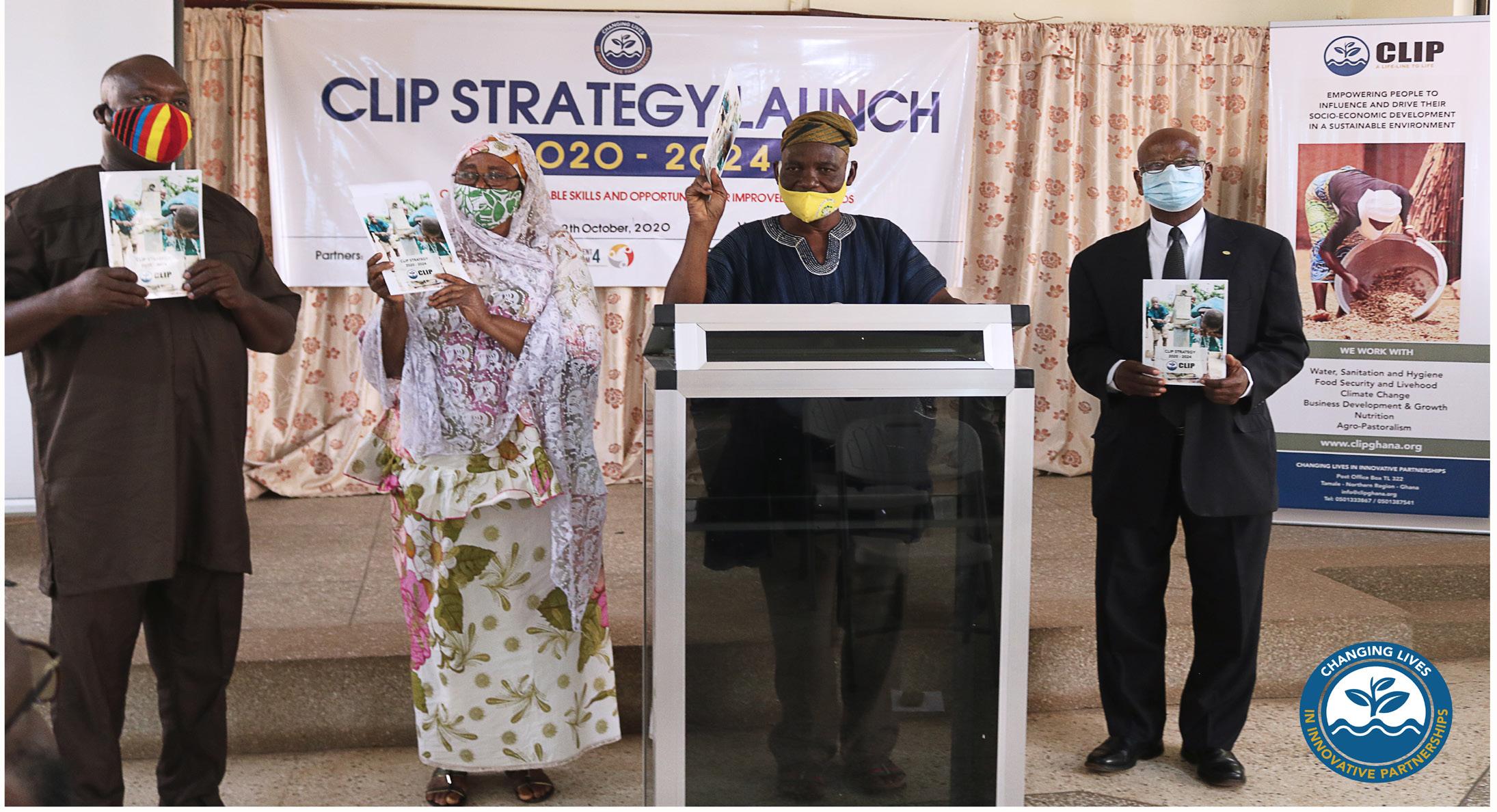
capacity building training on resource mobilization, knowledge management and the use of office 365. As part of the knowledge management process, new official email addresses have been created and in use. The office 365 has enhanced the work of staff through effective sharing of documents and improved collaborations. The staffs are now more familiar with the office 365 and are using it to enhance their work.
Also during the year, a two (2) day annual sustainable agriculture and business forum was organised. The event brought together farmers from Savelugu, Kumbungu, Mion, Karaga and Saboba districts, CSOs in food security and business development, aggregators, actors in the agricultural community value chain, experts, researchers and the media. The main theme was; Sustainable transformation of agribusiness in Ghana. The sub-themes for the forum included; Financing products and services to promote sustainable agribusiness in Ghana The future of agriculture in Ghana; Synergy between research and sustainable agriculture development Smart livestock farming; enhancing sustainable development
The farmers learned new channels such as the Research Extension farmer Linkage Committee (RELC) planning sessions at the district and regional level to communicate their agricultural challenges. Also, the agribusiness groups acquired new knowledge on the various products and services of the National Board for Small Scale Industries (NBSSI) and had their grievances addressed by the regional director. Linkage between farmers and aggregators was established to provide ready market.
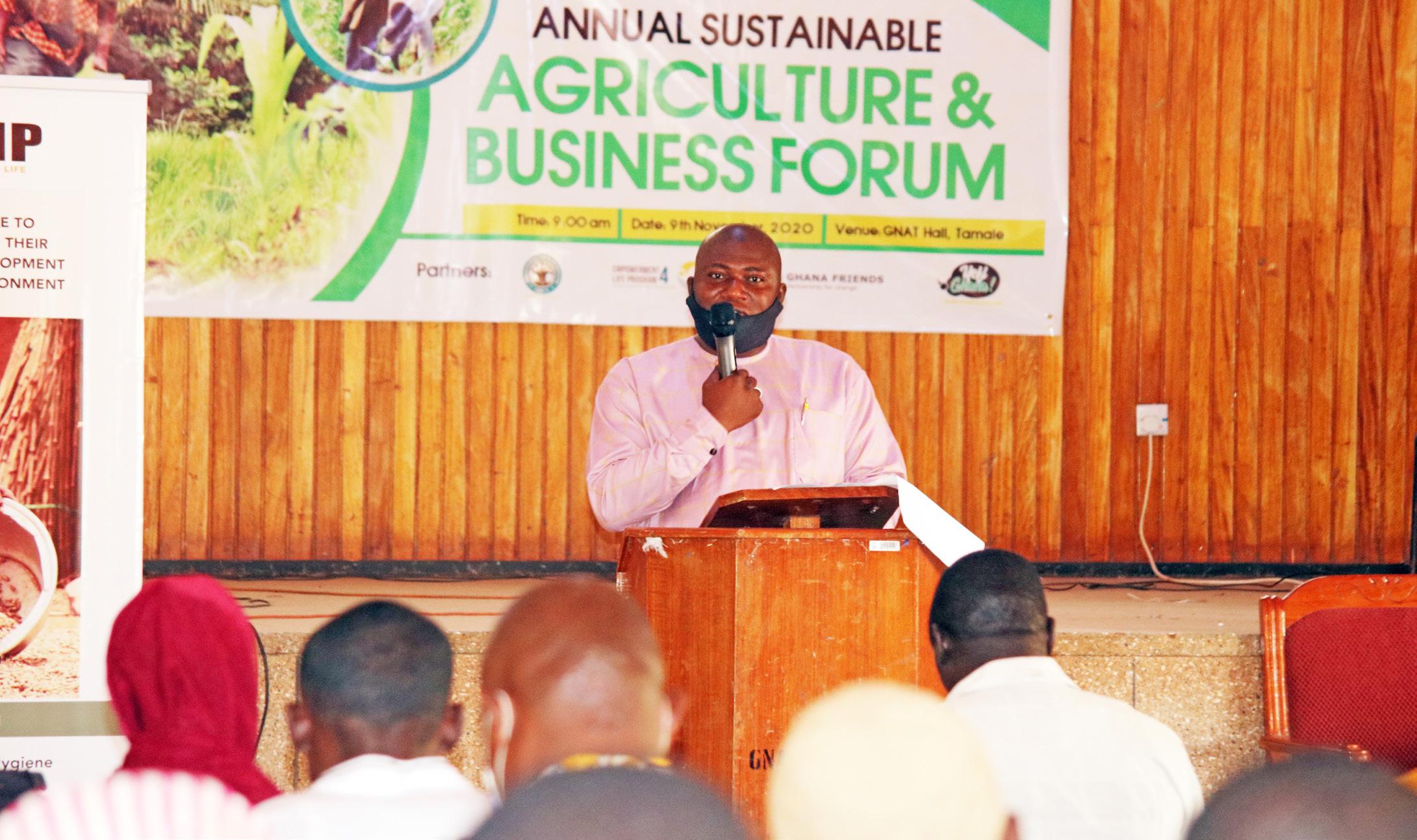
Partner Fundraising Activities and Collaborations with Other Donors
The fund-raising activities of the partners of the E4L program and changes observed in their collaborations with other donors are presented in this section. Specifically, projects currently being implemented with other donors and new projects that are yet to commence or anticipated are presented per partner organization.
YEFL-Ghana is currently implementing the following projects presented in the Table 9 and working to secure the other projects in the pipeline. Four projects are currently being implemented by YEFLGhana Ghana and five other projects have been applied for and are yet to be granted.
Table 9: YEFL-Ghana Projects won and in progress
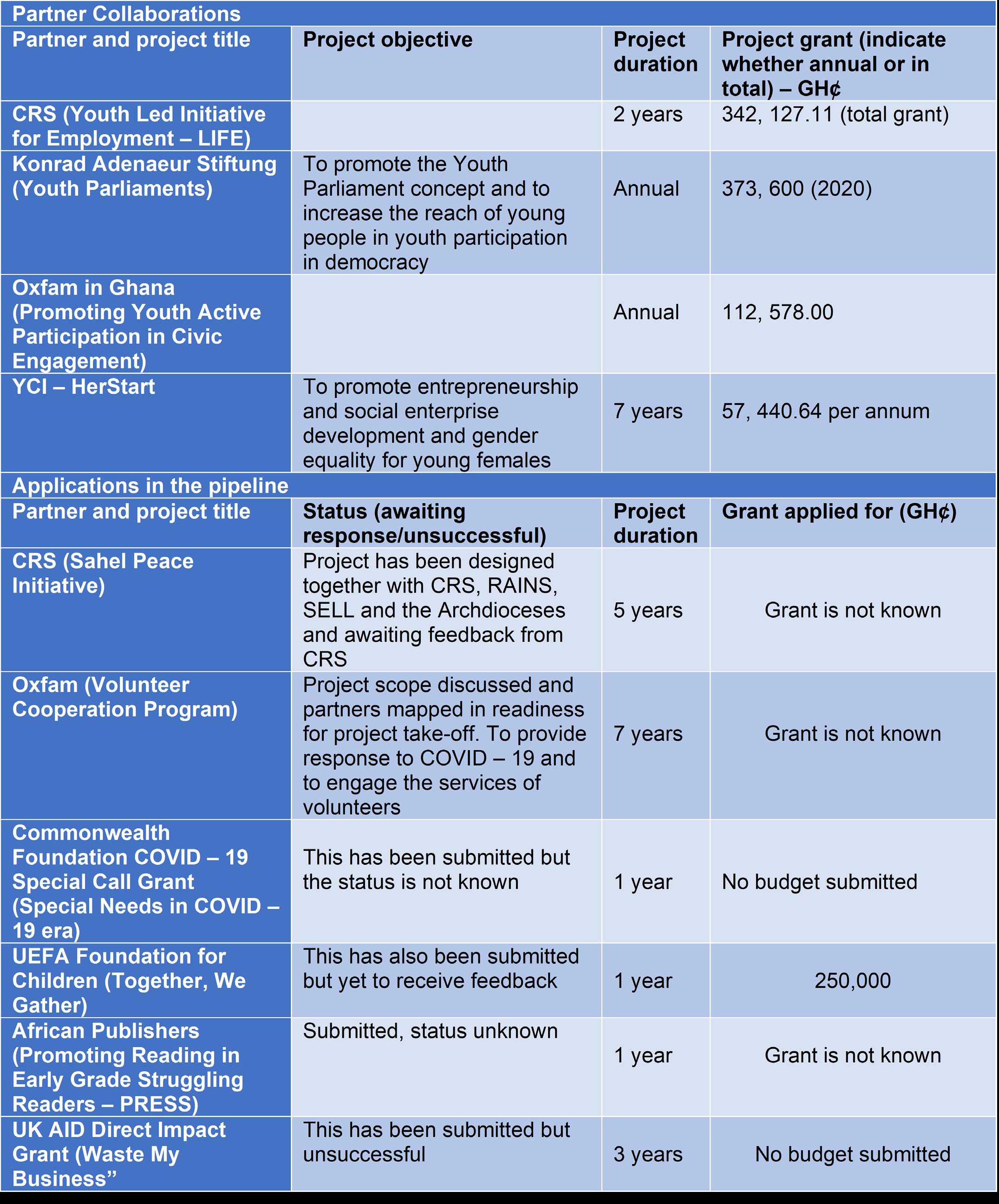
The following table presents projects GDCA has won and implementing and projects that are still being pursued. The table summarizes information about the project partners, objectives, duration and grant size per projects. GDCA is currently implementing five projects with other donors and three others are in the pipeline.
Table 10: Current GDCA Projects and those in pipeline
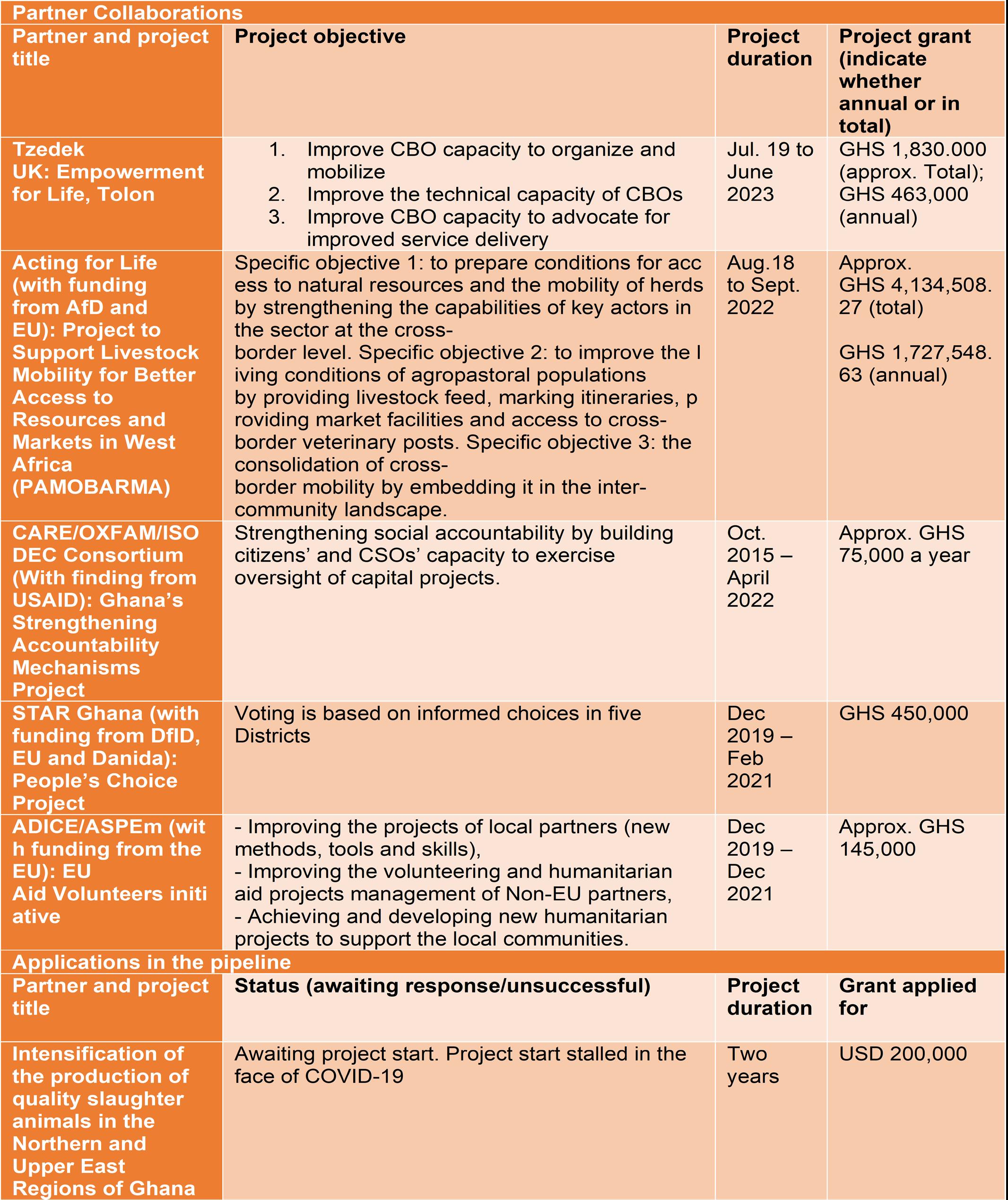
The projects currently implemented by SfL and those in the pipeline are presented in the Table 10 below. Contained in the table are description of each project’s partners, objective(s), duration and project grant size. In sum, SfL is currently implementing one project with Teach to Teach International and three others are in the pipeline.
Table 11: SfL projects
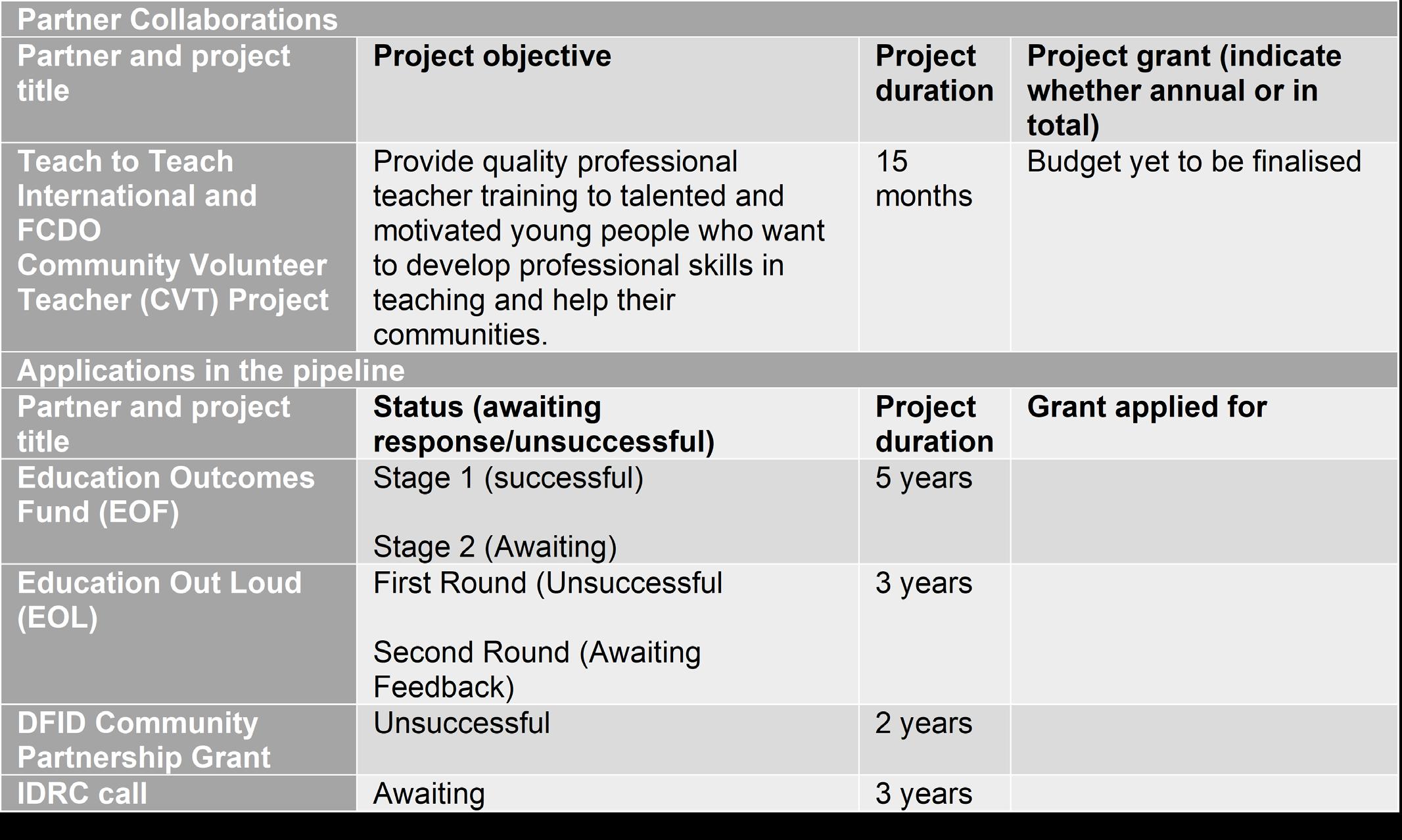
Changing Lives in Innovative Partnerships (CLIP)
During the period under review, CLIP won the second phase of the Adaptation Fund Project (AFP) being funded by UNDP and MESTI. The project locations include Northern, Upper East and Upper West regions. The project was for a period of 6 months and ended in November, 2020. CLIP also partnered/collaborated with French based organization; Positive Planet International and submitted a concept note and full application for an EU call on circular economy. The full application had a pass score of 85.5 but could not win the project. However, EU decided to put the full application on a reserve list for a possible funding. CLIP in a consortium including GDCA, UDS, Bawku Livestock market committee and Pong Tamale breeding Station submitted and won a project on PACBAO; Intensification of the Production of Quality Slaughter Animals. The table below gives highlights of the collaborations with other donors.
CLIP also during the period visited funding agents and CSOs for possible collaborations. These organizations include; Water Aid, Plan International, University of Ghana, CRS etc. and in the process, the 5 years strategic document of CLIP was shared to further elaborate on the thematic area and strategies employed to achieve the areas. Resource mobilization training for staff was conducted during the year to pave way for the development of resource mobilization and fundraising strategies in 2021.
Table 12: CLIP Projects
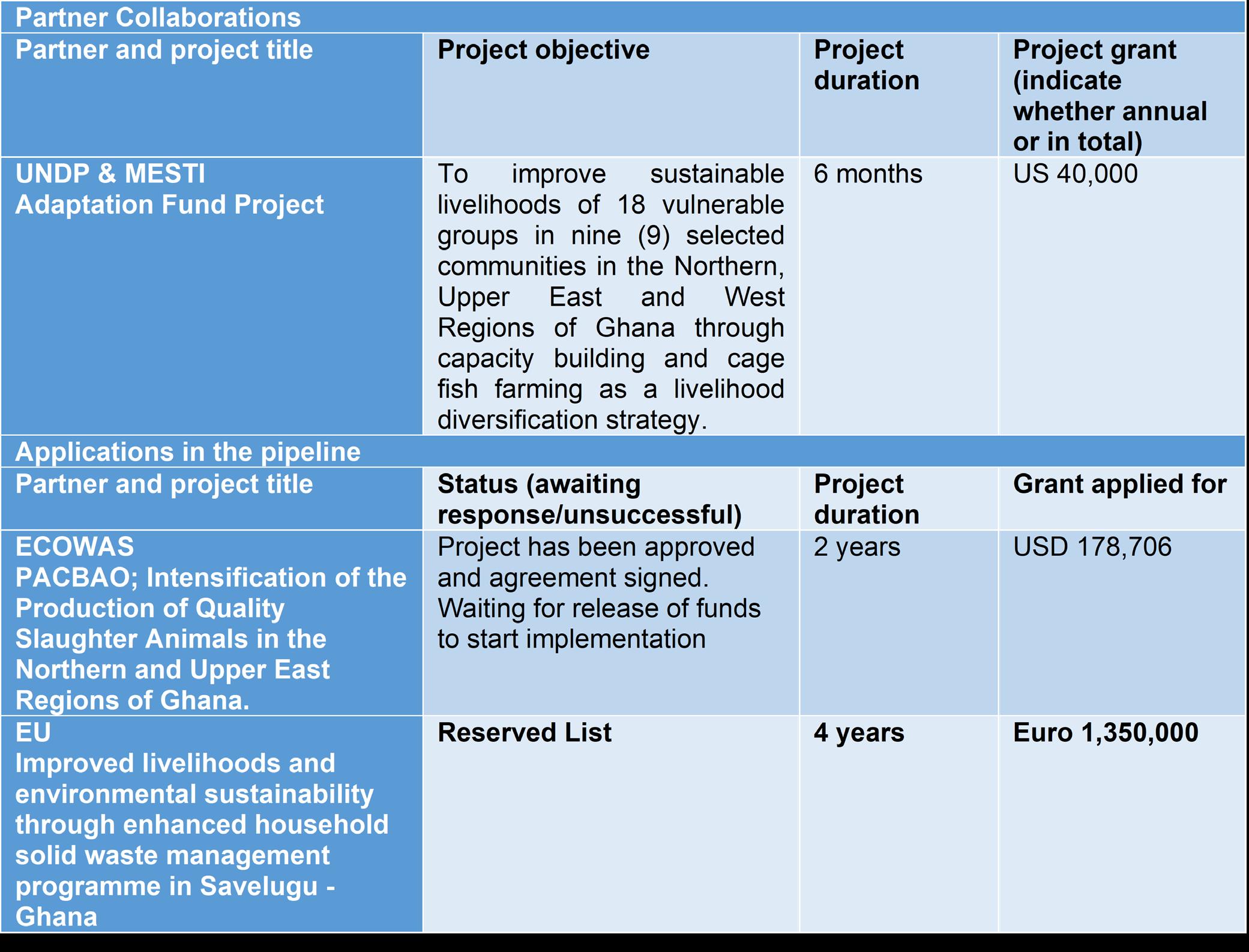
Partner Participation in Networks and Alliances
The E4L partners involvement in networks and alliances and changes that occured in 2020 as a result of these networks and alliances are report in this section per organization.
YEFL-Ghana
On the International Women’s Day, YEFL - GHANA collaborated with Right To Play to mark the day in 3 districts (Savelugu, Kumbungu and Tolon). The event brought together women, youth, parents and teachers to discuss a Gender Analysis report conducted by Right To Play. Gender Action Plans were developed at the end of the sessions for further engagements. The NRYN has built a stronger alliance with vibrant youth groups within the Northern Region including Activista, Ghana Youth Guide, and Camfed Alumni that has strengthened the youth force in numbers within the Region. The alliance with Ghana Youth Guide and other youth groups for example has supported the visibility of the RYN on social media. The NRYN has also cautiously involved known vigilante groups (Aluta Boys, Kandahar, Azorka Boys) in their peace campaigns. This has brought these groups close to stakeholders to dialogue about the roles of young people in promoting peaceful election. This approach has placed YEFL – Ghana as a youth focused CSO with the ability to mobilize youth for change.
International Day of Democracy
The 2020 international day of democracy was marked with a Press briefing session on 15th September 2020 on the theme “COVID-19: A spotlight on Democracy”. A press statement was issued with a number of recommendations. First of all, a call was made to use the day as an opportunity to reflect on the history of democracy around the world, thank those who influenced the development of our democratic nation and look for opportunities that will promote and protect Ghana’s democracy. Secondly, a call was made to use the December 2020 elections to democratize the system of government to achieve a more equitable allocation of power and resources in Ghana’s development process. Ghanaians were urged in the press statement to strive against the following: Vigilantism and electoral violence Media sensationalism, rumour mongering and politics of insult The politics of ethnicity The outcome of this event is that it contributed to relatively peaceful electoral processes in the Northern region in particular. Even though the December 2020 general elections were characterized by pockets of violence across the country, Northern region witnessed a significant reduction in electoral offences/ violence as compared to pervious elections. This notwithstanding, the death of one person in the Savelugu Municipality in post-election day processes and during the declaration of results, is regrettably one of the isolated incidences recorded during the 2020 general elections in Northern region. Overall, The outcome of this is that even though the nation witnessed pockets of election related violence, the Northern region recorded a relatively peaceful campaigning and voting election processes.
Good Governance Network
GDCA participated in the activities of two Good Governance Networks during the period namely; the Civil Society Platform on Good Governance (CSOPGG) and the Partnership for Good Governance (PAGG). PAGG, which is led by GDCA, marked the International Day of Democracy on 15th September 2020 as reported above.
GDCA also participated and supported the 2020 election observation processes under the CSO Platform on Good Governance (CSOPGG). GDCA supported pre-election observation and post-election observation press briefings. These contributed to the free, fair and transparent nature of the December 2020 general elections. Over 100 election observers were deployed across polling centres in three administrative regions namely; Northern, North East and Savannah. Overall, the elections were observed to be peacefully conducted across all these polling centres, with 93% of the observers rating the elections as good. That is, no significant disorder took place during the process, while only 7% rated it as having minor incidents (mostly disagreements among party agents during sorting of ballots), which did not have significant impacts on the election results.
Northern Network for Education Development (NNED)
GDCA has remained an active member of the Northern Network for Education Development (NNED). GDCA participated in the 2020 AGM of Northern Network for Education Development (NNED) on 15th October 2020. Elections were conducted as required by the NNED Constitution to constitute a new Executive Committee (EC) of NNED. GDCA was elected as the CSO representative in the EC. The Northern Network for Education Development (NNED) exists among other things to contribute to improve quality Education delivery in Ghana. The new EC has started making inputs into the Ghana Education Service (GES) Framework for coordination of operations of CSOs in the education sector in Ghana. NNED represents the 5 regions of Northern Ghana and has a mandate of fighting poverty and educational challenges in Ghana.
Northern Development Forum
GDCA took part in the work of the Northern Development Forum to develop a policy document to influence the development of manifestos of political parties in Ghana to capture development priorities of Northern Ghana. The process was initiated with the preparation of proposed development priorities following the outcome of the Northern Development Conference held in 2018. The proposed development priorities were then presented at Regional Stakeholder forums to validate. GDCA organized the validation forum for the Northern and Savannah Regions. The validated priorities document was then presented to the major political parties in Ghana. The result was that most of the priorities were reflected in the manifestos of the political parties.
As a follow-up, another Northern Development Conference was organized with GDCA’s participation at the planning and implementation stages. The conference brought together political leaders of the five regions of northern Ghana, chiefs, national level political leaders, CSOs, MMDAs and other interest groups. The conference generated public debate concerning who should be championing northern Ghana’s development? Is it northern Ghana’s elites or the State of Ghana?
These activities boosted the image of GDCA by making it possible to get in contact with other stakeholders in the development of northern Ghana including regional ministers, officials of the Northern Development Authority, CSOs and politicians. GDCA was invited by political parties to some of their activities such as consultations to get inputs to develop their manifestos.
Baobab Market
The Boabab Market led by GDCA in collaboration with Star Ghana Foundation organized a national convening on illegal rosewood trade in Ghana on the theme “Accountability of key actors in the illegal rosewood trade in Northern Ghana” in Tamale. The E4L program contributed to organizing this event. The national convening was a hybrid one including a face to face event and a virtual one for participants outside the region. The national convening brough together chiefs, the academia, regional foresty commisions, other national CSOs to dialogue on the effects of illegal rosewood trade and accountability of keys actors in the trade following a study on the political economy analysis of illegal rosewood trade in Ghana. The Star Ghana Foundation commissioned this study which was done by Bishop Akolgo (former ISODEC Executive Director). Findings from this study was discussed during the convening. Local and national level media channels and was live on social media.
The national convening in Tamale was followed by a press conference held at the GDCA office to engage the media more on the issues discussed during the convening and the recommendations for various stakeholders. This was covered by national and local level TV, radio and online media channels.
School for Life
School for Life is an active member of the Northern Network for Education Development (NNED). During the year under the review School for Life actively participated in Network meeting and has contributed inputs to various position papers and petitiions by the Network to the Government. For instance, in September 2020, when the governement solicited for inputs from stakeholders on the reopening of schools amidst COVID-19, through NNED, SfL made its inputs. Also, recently, when the government through the Ministry of Education came out with a draft ’Framework for Cordination and Harmonising the Operations of NGOs, CSOs and Faith Based Organisations in the Education Sector in Ghana’, NNED issued a position paper on it with inputs from SfL and other NGOs in the regions. As a result of SfL’s contribtuions in advancing the objectives of the Network, it was nominated to the Executive Committee (Board) of the Network as the NGOs representative.
School for Life also participated in a regional education stakeholder engagement meeting held at the instance of the Newly posted Regional Director of Education. This meeting was organised for the Regional Director of Edcuation to familiarise himself with the key education stakeholders in the region and to create opportunities for collaboration in order to enhance coordination and synergy in education in the region.
School for Life also worked with members of the CBE Alliance including OXFAM, World Education, Afrikids etc and sent a memorandum to parliament during parliament’s consideration of the Complementary Education Bill. The Memorandum was postively received by parliament and the Bill has since been passed into law.
Changing Lives in Innovative Partnerships (CLIP)
CLIP participated and shared its experience in effectively managing farmer-herder conflicts in Northern Ghana in an ECOWAS-UNOWAS experience sharing workshop in Abuja, Nigeria. The workshop brought over 70 participants from five ECOWAS member states and each country shared their experience on the prevention and resolution of conflicts between farmers and herders in West Africa. Relevant local actors such as farmers, herders, national government officials, regional and international NGOs etc from Ghana, Mali, Guinea, Senegal and Nigeria were also present in the workshop. The organization had increased knowledge on farmer-herder conflict management strategies employed in other West African countries. The workshop further presented networking opportunities for CLIP as it exposed the organization to institutions, associations and individuals with interest in farmer-herder relations management.
During the year, CLIP also participated in the Joint Regional Workshop co-organized by ECOWAS, AUC and UNECA (United Nations Economic Commission for Africa), Le Bureau National d’Études Techniques et de Dévelopement (BNETD) and University of Côte d’Ivoire (Department of Tropical Geography) from 17th – 20th February 2020 at Grand Bassam, Abidjan, Cote D’Ivoire. This workshop focused on Climate Change, Adaptation, and the GMES & Africa projects. The three consortia implementing the GMES-Africa programme in West Africa are Centre de Suivi Ecologique (CSE) of Senegal, the University of Ghana (UG) and the Centre for Space Science and Technology Education (CSSTE) of Nigeria. The overall objective of the workshop was to share with stakeholders and decision-makers the relevant information and tools developed by the three (3) consortia and to strengthen collaboration among stakeholders for the sustainable implementation of environmental policies at continental, regional and national levels. CLIP’s participation in the workshop was through a recommendation from the Department of Earth Sciences of the University of Ghana, which is a member of the consortia. Participating in the program exposed CLIP to academic and social research conducted by consortia members to find more productive climate change adaptations mechanisms especially in floods management. It also presented an opportunity to meet and network with institutions and organizations working in the area of climate change for future engagements to learn more in the field of climate change and adaptation.
The representation of CLIP in the Ghana Cattle Ranching Committee (GCRC) at the national level continued during the year. CLIP participated in two quarterly meetings organised during the year to discuss key issues on effective management of agro pastoral activities in the country. The meetings also looked at effective dialogue and collaboration in linking up with our neighbouring countries (Togo, Burkina Faso and Cote D’Ivoire) in the effective management of transhuman herders across our common borders. Further discussions on agro-pastoral infrastructure development across the country in areas that have conditions suitable for livestock development were assessed. CLIP shared its experience and the projects/activities being
implemented to improve livestock infrastructure in the country. The organization’s participation in the Committee has increased CLIP’s contacts with key actors at the national level especially in the Animal Production Directorate of MoFA and made CLIP a reference point for information and advice on agro-pastoral development issues. CLIP also participated in Mole XXXI WASH conference organized by CONIWAS in Accra. The conference provided space for over 400 participants from CSOs, Governments, the Private sector, academic and research institutions and Development partners to adequately address WASH issues; especially sustainable WASH services against the backdrop of emergencies. The main theme was; Prioritizing and Refocusing Sustainable WASH service Delivery: Lessons from the COVID-19 pandemic. The sub-themes were; Drinking water supply and Integrated Water Resource Management Environmental Sanitation and Hygiene Governance and Institutional Development Technology, Innovations and Private Sector Participation.
The organization interacted and networked with other CSOs, the Private sector, research institutions for possible future collaboration and partnerships. The organization also took advantage to share with other participants the new strategic document.
During the period under review the E4L program continued to work closely with the CSIR-SARI to get foundation seeds for demonstration farms in the districts. There is high level of cooperation and collaboration with state actors such as the department of agriculture (regional and district), veterinary department and the District Assemblies. The program collaborated with Link Ghana to facilitate and promote the production and marketing of organic/pure honey among livelihood groups in communities as a diversification strategy. Similarly, there was cooperation with Decentralized Composting (DeCo) and Urbanet in promoting organic compost preparation and its application and dry-season vegetable production. The E4L program continues to engage and work with the Peasant Farmers Association of Ghana to speak out the needs and grievances of smallholder farmers in the communities through advocacy. Discussions are being held to link the farmer associations in the E4L districts to the national level for effective advocacy and engagement.
